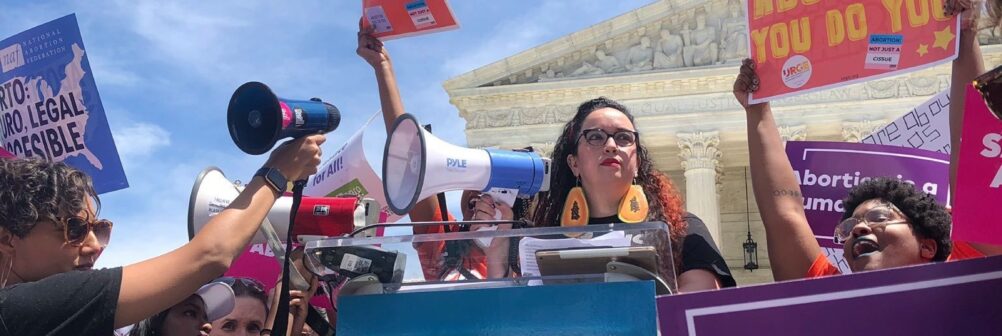Black People Must Risk Their Lives to Save Their Communities
Black people are braving a pandemic to demand freedom from state violenceRachel Waters
rwaters@urge.org
706-831-1667
(Washington, DC) — Remarks by Preston Mitchum, Policy Director at URGE: Unite for Reproductive & Gender Equity spoken at Defending Black Bodies: A Reproductive Justice (RJ) Townhall on June 5, 2020, regarding the connection between reproductive and gender justice for Black communities and the Movement for Black Lives.
“First, I’d like to acknowledge the Black women reproductive justice (RJ) leaders who organized this essential conversation ignited by the righteous indignation of Black people in the spirit of our pain, protest, and action. I’d also like to thank my fellow speakers for their powerful testimony.”
“This global uprising in support for Black lives didn’t happen in a vacuum. Violence against Black people led to this. Can you imagine how angry people must be to go outside — by the thousands — during a pandemic to protest anti-Black police violence? That’s how tired people are. People are willing to risk their lives to gather outside just so they can risk their lives all over again to stand up to the police.”
“But Black people risk our lives every day. In a pandemic that kills more of us than any other group. In a health care system that fails Black pregnant folks. In a country that ignores violence against Black trans women.”
“Despite all this, Black people still showed up to protest because — even though the world seemed to stop for the pandemic — the killings of Black people only accelerated.”
“Reproductive justice for Black communities requires us to dismantle the police and prisons that steal our families and futures from us. We can’t have reproductive justice when Black parents see their children killed by police. When, even as children, Black people are seen as ‘threats’. Tamir Rice, from Cleveland, Ohio, is just one example. We can’t have reproductive justice when Black trans, queer, and young people are killed because a non-Black person sees us as dangerous.”
“As we protest, police are enacting further violence against young Black folks — many of whom are queer and trans — even running over protestors with police vans. This is unacceptable.”
“In Ohio, my home state and one of URGE’s investment states, my colleague Jordyn was attacked by the police. I am sharing this story with her consent and offering a trigger warning of misogynoir and violence.”
“Soon after Jordyn arrived downtown, the Columbus Police Department pepper-sprayed her in the face at point-blank range, grabbed her by the hair and then threw her to the ground. She is safe now, but this caused serious trauma.”
“The violence of Ohio police happens against a backdrop where over half of pregnancy-related deaths in Ohio were preventable and Black women are dying at a rate more than two and a half times that of white women. That’s why we continue to push for both mass mobilization and policy change. We must divest from local, state, and federal police budgets and directly invest in Black and brown communities’ education, employment, healthcare, and housing.”
“This year, URGE published our Young People’s Reproductive Justice Policy Agenda, where we set forth six policy priorities: Real abortion access; sex ed; democracy reform; economic justice; decriminalization of sex work and creating safe communities; and immigrant justice.”
“In a bit of hopeful news, Congresswomen Pressley, Omar, Lee, and Bass proposed a resolution condemning police brutality. Keep fighting, it’s working.”
“The truth is, no matter what legislation is ultimately proposed, WE are the ones who keep us safe. WE are who we need to survive. We must continue to push to defund the police and invest in our communities. And we must push local, state, and federal lawmakers to do the same.”
“My friends, don’t give up. Let’s keep reproductive justice front-and-center. Let’s keep fighting for Black people and against anti-Black police violence together. Thank you.”
###

